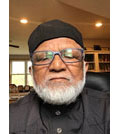The July Revolution in Bangladesh Is Rooted in Meta-Modernist Philosophy
 28 Oktober 2024
28 Oktober 2024
By Mawdudur Rahman and Habib Siddiqui
BOSTON / PHILADELPHIA, Oct 28 2024 (IPS)
The students and the common people of Bangladesh dared to do something in 36 days of July-August that was considered simply impossible by most people just days before August 5, 2024. They said ‘enough is enough’ to an old order that outraged their humanity, robbed their dignity and the rulers imagined that their citadel of power was simply impenetrable. The revolutionists refused to bow down to the murderous regime that knew no bounds to its cruelty and plundering. They were ready to sacrifice their lives for the freedom of the besieged nation.

Mawdudur Rahman
This revolution is unique in so many ways. It is a revolution in the digital age that is rooted in meta-modernist philosophy. The old political leadership with its moribund appeal and bankrupt philosophy proved irrelevant in this agenda. As Professor Yunus, the Chief Advisor to the Interim Government, has rightly said, ‘Now is the era of a new generation’.
Meta-modernism is the cultural philosophy of the digital age, coined by Mas’ud Zavarzadeh in 1975. meta-modernism is the Age of the Internet or more balanced worldview. As one analyst puts it, we went from modernism — “Make it new!” Let’s shape History! – to postmodernism — everything sucks! Nothing really matters! — to meta-modernism – maybe things are not this black-and-white, maybe there’s a middle ground.
Meta-modernist thinkers perceive the present world around them as a threat to their very existence. They work with pragmatic idealism and have no grand narrative thinking or any orthodox certainties. In other words, they try to strike a balance between all of this. They recognize that they have to face the problems of the society.

Habib Siddiqui
Arguably, all the activities of Bangladeshi revolutionists including their wall posters, followed a framework of Meta-Modernism. It is understood that the new Bangladesh is defined in a new ideology. Student revolutionaries have said that our ideology is reflected through the language we use. The basis of the new ideology is language. It is a revolution of change from the cultural context of fascist imperialist language to the native (spoken) language of the people. In other words, new ideals will be reflected through the language of the people.
It would be wrong to think that this people’s revolution was all about a change of government. Its victory is unlike 1947 and 1971. In both those cases, there was a change of government without any structural change. As a result, the incoming government followed imperialist practices of exploitation left behind by the British. Subsequent governments turned the country into a failed democracy, in order to control, exploit and subjugate its citizens. The police were used as an enabling force to subjugate the citizens, while the legislature and judiciary worked as the rubber stamps to sustain the total control of the government. This evil social system has corrupted the mindset and behavior of our people. An immoral society was formed with no fear of accountability, whose driving force was unfathomed greed and mantra — the ‘rule and exploitation by repression’. Government employees saw themselves as bosses and not as public servants. They thrived upon corruption at all levels.
There are now two competing ideologies in front of Bangladesh – one of decaying fascism that wants to resurface under old leadership and the other is the young leadership of equality and morality. As the revolution demonstrated, the ‘New Bangladesh’ does not approve fascist-supporting corrupt institutions. It desires a corruption-free new society. It is for paradigm shift – a transformational change.
The Chief Advisor and Student Coordinators have clearly highlighted the ideals of New Bangladesh through their speeches and interviews. Dr. Yunus said, ‘We are all one nation’. This is a clarion call to establish a holistic change in society. Such a radical change in society requires a change in values. A change in values lies in the change in public ideology.
The new Bangladesh is not the old Bangladesh with a new cover. It demands a change in the fundamental values of human behavior, actions, and beliefs. These include structural changes, personal changes, expectations.
To understand the ideology of this change, one has to listen carefully to the speech of Mahfuz Alam, the ‘thinker’ of the movement. Five points can be deduced from his recent talks: (1) unity, (2) ‘language is their inspiration’, (3) group leadership, (4) they are children of time, and that (5) they are not a slave to traditional thinking. His views reflect today’s meta-modernism.
For any transformational change to succeed, the change agents must own it, direct it, and ultimately excel in it. We think that this revolution of holistic change can benefit from the revolutionary approaches adopted in China and Cuba that were also led by youths. They owned the revolution and did not allow it to be hijacked by the reactionaries. We see some of these characteristics in the minds and mission of the Bangladeshi revolutionaries.
The bottom line is, bringing any changes in old culture habits was never an easy task. This revolution has presented an opportunity to change the destiny of Bangladesh as never before.
The meta-modernist youths of Bangladesh have come to lead and move forward; they will not go back to the old ways. Their message is clear: if you do not join us, the country will not wait for you. If older generations do not adopt the new view of change, we fear further instability and chaos to come, whose outcome cannot be pleasant.
Dr. Mawdudur Rahman, Professor Emeritus, Suffolk University, Boston, USA. He can be contacted at: [email protected].
Dr. Habib Siddiqui is a peace and human rights activists. His latest book – ‘Bangladesh: a polarized and divided nation?’ is available in the Amazon.com. Both are members of the steering committee of Esho Desh Gori – Let’s Build Bangladesh.
IPS UN Bureau
